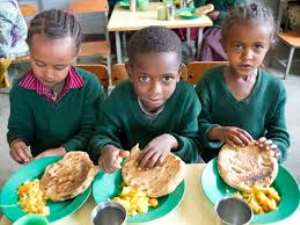
Mrs. Kate Quarshie, Acting Head of Nutrition, Ghana Health Service has called on Journalist and media practitioners to support the efforts of health institutions in the country towards the fight against under nutrition which is a significant contributor to poor health.
She said the media has a major role to play in sensitizing the general public on health issues and charged Journalists to use the power at their disposal to educate the public on how to deal with malnutrition which has become a burden to Ghanaians.
She equally called for a strong advocacy support on part of the private sector and other stakeholders to help scale up nutrition interventions and offer support for social behavior change activities on nutrition stressing that championing nutrition will result in further gains in economic growth, education and health in the country.
Mrs. Quarshie made this observation when addressing a group of Journalists at a one-day media Practitioners Capacity Building workshop on nutrition organized by the Ghana Coalition of Civil Society Organizations for Scaling up Nutrition (GHACCSSUN) in Accra last Wednesday.
“One in every thirteen Ghanaian children dies before his or her fifth birthday whiles more than half of those deaths are associated with undernutrition, moreover undernourished children are more likely to die of illnesses, including malaria, diarrhoea, pneumonia and complications from HIV and AIDS, than children who are not undernourished” said Mrs Kate Quarshie.
Adding that 1 in 48 women in Ghana is at risk of dying from causes related to pregnancy or child birth which 1 in 5 of those deaths is related to iron deficiency anaemia.
She identified major nutritional problems in Ghana as undernutrition which results to stunting, wasting, and micronutrient deficiency coupled with over nutrition and associated diet-related diseases which she described as double- burden of malnutrition.
She revealed Ghana's statistic in terms as prevalent rate for malnutrition for the year 2003 as 35% whiles 28% in 2008, but in 2011 reduced to 23% which she noted though the figures show a gradual reduction the most recent figure indicates that more than 1 out of 5 children are too short for their age describing it as unfortunate.
According to her, research has shown that despite all these challenges faced by the country; however there is still hope because undernutrition is preventable envisaging that in the next ten years to come, investment in proven effective nutrition interventions wouldsave 30,000 lives by preventing underweight, save the lives of more than 25,000 childrenby decreasing vitamin A deficiency and prevents permanent brain damage in 500,000 children by decreasing iodine deficiency.
“Promotion of optimal breastfeeding, appropriate complementary feeding, improved hygienic practices,Vitamin A supplementation, de-worming, and Iron-folate supplements for pregnant and lactating women, salt iodisation, fortification of staple foods, multiple micronutrient powders and treatment of severe acute malnutrition† with special foods, such as ready-to-use therapeutic foods are proven effective nutrition interventions” she suggested.
“These interventions are being implemented but not at scale. They need to be scaled up across the length and breadth of the country.” Mrs. Quarshie stressed.
While congratulating the Ghana Coalition of Civil Society Organizations for Scaling up Nutrition (GHACCSSUN) for a good job done in building the capacity of Journalists in nutrition reporting for the second time, she lamented on Journalists lack of knowledge in reporting issues pertaining to malnutrition; urging them to make judicious use of the opportunity offered to turn things around for the better.
She was optimistic that the Ghana's malnutrition situation will change if the media and the private sector assist the Ghana Health Service and other health institutions in the country by playing a key role in educating the public as a way of contributing their quota to the fight against malnutrition.
The 2nd Media Practitioners Capacity Building workshop on nutrition was aimed at equipping the Journalists with deeper knowledge and skills in dealing with and covering key aspects of nutrition and its multifaceted impact on Ghanaians.
It also seeks to produce a cadre of mass media personnel who are sensitive to nutrition challenges that confront Ghanaians and equally intended to kick start a network of nutrition reporters that can work with GHACCSSUN and government to push nutrition agenda forward.
GHACCSSUN envisages a future where all citizens of Ghana have access to quality and nutritious food for a productive and prosperous society.




 Elisu By-election: "If you call yourself a man, boo Chairman Wontumi again" — Bo...
Elisu By-election: "If you call yourself a man, boo Chairman Wontumi again" — Bo...
 Fuel tanker driver escapes with his life after tanker goes up in flames near Suh...
Fuel tanker driver escapes with his life after tanker goes up in flames near Suh...
 Uniform change: ‘Blue and white are brighter colours’ — Kwasi Kwarteng explains ...
Uniform change: ‘Blue and white are brighter colours’ — Kwasi Kwarteng explains ...
 MoE not changing all public basic school uniforms but only newly built ones — Kw...
MoE not changing all public basic school uniforms but only newly built ones — Kw...
 We’re only painting new public basic schools blue and white – Dr. Adutwum clarif...
We’re only painting new public basic schools blue and white – Dr. Adutwum clarif...
 Bawumia has lost confidence in his own govt’s economic credentials – Beatrice An...
Bawumia has lost confidence in his own govt’s economic credentials – Beatrice An...
 I fought WW2 at age 16 – WO1 Hammond shares At Memoir Launch
I fought WW2 at age 16 – WO1 Hammond shares At Memoir Launch
 GRA-SML deal: Regardless of what benefits have been accrued, the contract was aw...
GRA-SML deal: Regardless of what benefits have been accrued, the contract was aw...
 April 26: Cedi sells at GHS13.75 to $1, GHS13.18 on BoG interbank
April 26: Cedi sells at GHS13.75 to $1, GHS13.18 on BoG interbank
 Champion, promote the interest of women if you become Vice President – Prof. Gya...
Champion, promote the interest of women if you become Vice President – Prof. Gya...
